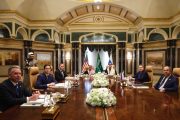
In an institution dominated by dictators and notorious for corruption and scandals, it takes a lot to stand out or attract worldwide condemnation and scrutiny from across the political spectrum. Director General Francis Gurry (shown) with the United Nations World Intellectual Property Organization (WIPO), though, has managed to accomplish precisely that — secretly sending technology to dictators, stonewalling investigations, allegedly retaliating against whistleblowers, engaging in alleged corruption and cronyism, and much more. Now he is even threatening journalists with criminal prosecutions for reporting on official documents outlining the alleged abuses.
Indeed, in the wake of a growing non-stop parade of mega-scandals including fresh allegations by a senior WIPO official, the powerful UN agency chief has resorted to literally terrorizing reporters and media outlets into silence. In a letter now posted online, the UN agency’s attorney, on behalf of Gurry, threatened a journalist who reported on the extremely serious allegations swirling around the WIPO chief with potential civil and criminal liability. However, despite the lawless intimidation, critics are still speaking out as official calls for an independent investigation grow too loud to ignore. Gurry remains defiant.
The latest scandal to hit WIPO, a powerful UN agency funded largely by U.S. inventors and charged with overseeing the international intellectual-property regime, stems from allegations made by a widely respected deputy director with the outfit, James Pooley. The senior American WIPO official, responsible for innovation and technology at the agency, filed an official complaint accusing Gurry of “serious misconduct.” The report, which followed another formal complaint against Gurry by a separate senior WIPO employee, also called for an independent investigation.
“Specifically, l draw your attention to (1) the taking of DNA from senior WIPO staff members without their knowledge or consent, in violation of fundamental human rights, as well as efforts to suppress evidence and investigation of the incident; and (2) evidence of the corruption of a recent procurement that was redirected and awarded to an Australian company led by an acquaintance of Mr. Gurry, even though that company had not been selected in the competitive process,” Pooley said in his explosive accusations, contained in a formal misconduct report filed with WIPO’s General Assembly also alleging “violations of national and international law.” The document called for Gurry to be suspended if he refused to cooperate.
Gurry continues to deny the accusations. However, they were considered serious enough that the delegations of multiple WIPO member states called for an independent investigation as well. The allegations also sent shockwaves through the intellectual-property community around the world. Under heavy bipartisan pressure from lawmakers in the U.S. Congress, even the Obama administration — which has earned a reputation as a stalwart supporter of all things UN regardless of the never-ending scandals and abuses — joined the growing chorus of voices calling for an external probe of the agency’s director general.
“The United States is deeply committed to the principles of transparency and accountability, including whistleblower protections, in all international organizations,” the U.S. government delegation in Geneva claimed in a statement after Gurry was somehow re-appointed for another term. “We strongly support the call made in the General Assembly meeting today for a full, independent, and external investigation of the entirety of the complaint filed by a WIPO Deputy Director General. We expect this investigation to be implemented promptly and executed expeditiously.” The State Department echoed those concerns, but so far, it does not appear to be taking any serious actions toward accountability.
Instead of an independent probe or dealing with the accusations, Gurry and his WIPO attorneys decided to go after the journalists who reported the allegations. Patent attorney Gene Quinn, president and founder of IPWatchdog, published an article about the allegations and provided a link to the full complaint — essentially basic journalism as understood in countries with even a semblance of press freedom. In a letter to Quinn sent by WIPO Legal Counsel Edward Kwakwa, however, the scandal-plagued UN outfit demanded that the official report alleging misconduct be removed under threat of major legal action.
“We hereby request that you immediately remove the Report and all its exhibits or annexes from the website,” read the threatening and bizarre letter from the WIPO attorney. “We hereby further request that you publish an apology to the Director General of WIPO for the publication of false and defamatory material on the website. Please be informed that if this request is not immediately acceded to, the Director General and WIPO will seek independent legal advise [sic] to bring defamation proceedings against you in any competent jurisdiction.”
Quinn, who was recovering from surgery, decided to remove the report and the article, but expressed outrage at the tactics. “It is utterly incomprehensible that an agency of the United Nations would threaten a journalist with criminal prosecution and personal civil liability for providing information contained in an official complaint filed by a whistleblower alleging misconduct,” the IPWatchdog chief wrote, saying he had published nothing defamatory and was a firm believer in the First Amendment and free speech.
The leading self-described blogger also highlighted the threat to Internet freedom that could come from granting the UN or one of its agencies control over the Web. “Censorship of media is wholly unacceptable, but censorship of the Internet threatens us all,” he said, adding that WIPO’s attacks had resulted in significant chilling effects on speech and media. “It is inappropriate to threaten journalists like WIPO did in this case, but it is particularly inexplicable now when fears of censorship and control of the Internet are openly being discussed. Would this be the future of the Internet under international control?”
Intellectual Asset Management magazine also jumped into the fray, lashing out at WIPO and Gurry for the threats against Quinn. “Leaving aside the issue of how Kwakwa knows that what Pooley has alleged is ‘false and defamatory’, threats of legal action against Quinn, as well as mention of possible criminal prosecution elsewhere in Kwakwa’s letter, raise serious questions about the commitment that Gurry and WIPO have to press freedom,” wrote Joff Wild, the editor. WIPO remained defiant when contacted by the magazine for comment.
For Quinn and others, though, the matter is not over, and the threats are deeply unsettling — as is the fact that Gurry was re-appointed despite the stench of scandal and the lack of independent investigations. In a follow-up commentary after the WIPO threats against free speech and the press, Quinn blasted the UN and its intellectual-property agency in particular.
“WIPO is an agency of the United Nations, so I suppose a Gurry reappointment was to be expected,” observed Quinn. “After all, the UN is poised to declare that the Catholic Church’s pro-life teachings are tantamount to torture” and “has historically always had extraordinary abusers of human rights on the Human Rights Council, such as Cuba, Libya, Saudi Arabia, Egypt and China, to name but a few.” All the while, he added, “the UN never seems to miss an opportunity to demonstrate its anti-semitic nature.”
“So does it come as a shock to anyone that an intellectually and morally bankrupt organization like the United Nations would appoint Gurry for a second term? It doesn’t surprise me one bit,” Quinn added. “After all, what is the problem with appointing someone who has been the subject of one scandal after another, which insiders allege have been covered up or simply not investigated. And in a world organization dominated by tyrants, dictators and repressive regimes, it certainly isn’t a problem when WIPO, presumably at the behest of Gurry, threatened a journalist with criminal prosecution for posting a copy of a public record document that itself alleged serious misconduct by the Director General.”
It was “ill-advised” to threaten criminal and civil prosecution, Quinn continued. “Once a report of misconduct is removed due to the threat, the imagination runs wild,” he said. “It also makes Gurry look like he has something to hide, because unlike the rest of the world, the United States has a First Amendment and there is no way that publishing a public record document that asserts allegations of misconduct by a government official would ever be determined to be defamatory.”
The New American reported in early March that Gurry, an Australian, was on the verge of being re-elected director general of WIPO by the outfit’s member regimes. Due to a series of scandals, there was major controversy at the time surrounding the bid — to put it mildly. Among the actions that sparked outrage: Gurry sending dual-use computer technology to the brutal dictatorships ruling over North Korea and Iran in violation of U.S. law, refusing to cooperate with congressional investigators, allegedly punishing whistleblowers, then engaging in an alleged cover-up of the schemes.
After that, serious allegations surfaced, reported by Reuters and other media, suggesting that Gurry sent the technology in exchange for votes. The WIPO chief was also exposed plotting to set up offices in Moscow and Beijing without consulting member states, sparking outrage among Western delegations. Separately, in an alleged bid to find out the identity of WIPO insiders blowing the whistle, senior officials at the agency complained that Gurry had misused Swiss police resources and unlawfully stolen DNA from employees. Still, amid all of that, the director general was re-appointed to another term, lasting through 2020.
The scandals and Gurry’s re-appointment at WIPO illustrate more than a few important problems at the UN more broadly. Aside from being dominated by dictatorial regimes and lawless bureaucrats hiding behind “diplomatic immunity,” it has become clear that there is no accountability at the global outfit. In recent years, the UN has increasingly turned its swarms of bureaucrats loose on the United States, attacking the U.S. Constitution, unalienable rights guaranteed in the U.S. Bill of Rights, the decisions of voters, state sovereignty, gun rights, and even the decisions of local government last week. Now it wants to control the Internet, too.
If the WIPO scandals and threats offer any indication of how an empowered UN would behave, Americans must defund and withdraw from the outfit as soon as possible. A bill already introduced in Congress by Rep. Paul Broun (R-Ga.) and eight co-sponsors, H.R. 75, the American Sovereignty Restoration Act, would do exactly that. However, it remains to be seen whether lawmakers and the Obama administration are willing to do more than, as some analysts described the U.S. response to the WIPO scheming so far, “talk tough.”
Photo of WIPO General Director Francis Gurry: AP Images
Alex Newman, a foreign correspondent for The New American, is currently based in Europe. He can be reached at [email protected]. Follow him on Twitter @ALEXNEWMAN_JOU.
Related articles:
UN Agency May Reappoint Boss Despite Scandals, Helping Tyrants
Lawmakers Blast UN for Handing U.S. Technology to North Korea, Iran
UN Plotting to “Dramatically Alter” Your Views and Behavior
UN Demands Obama “Nullify” Stand Your Ground Laws
The United Nations: On the Brink of Becoming a World Government
Ruthless Tyrants Win Seats on UN “Human Rights” Council
Internet “Governance” Summit in Brazil Advances UN Control
UN “Human Rights” Bureaucrats Demand Global “Law” for Detroit
Sudan’s Mass-murdering Tyrant May Join UN “Human Rights” Council
Obama Budget Supersizes U.S. Funding for UN, Global Military





